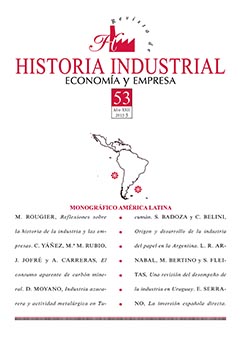Sugar industry and metallurgical activity in Tucumán (1870-1940)
DOI:
https://doi.org/10.1344/rhi.v22i53.21001Keywords:
Regional History, Technology, Adaptation, Firm BehaviorAbstract
This work examines the development of the metallurgical sector associated with modern sugar industry in Tucumán province (main production centre in Argentina). We analyze the dynamics between the sugar factories, the network of foundries and the mechanization of pieces and machinery. As sugar mechanized, forges and mills emerged to supply the increasingly mechanized sugar industrial sector. We hypothesize that metal casting and mechanical parts were the activities that incorporated the highest level of available technology. These activities were closely connected to the sugar industry because they supplied its inputs and machinery. We argue that foreign companies initially introduced new and innovative technology and helped advance the process of imitation and local innovation to supply foreign-made machinery, in particular during economic downturns.Downloads
Downloads
Published
How to Cite
Issue
Section
License
The author assigns all rights to the publisher. Creative Commons
The author who publishes in this journal agrees to the following terms:
- The author assigns all intellectual property rights exclusively to the publisher for the entire duration of the applicable intellectual property rights.
- The publisher will distribute the texts under the Creative Commons Attribution License, which allows others to share the work, provided that they acknowledge the authorship, its initial publication in this journal, and the conditions of the license.





